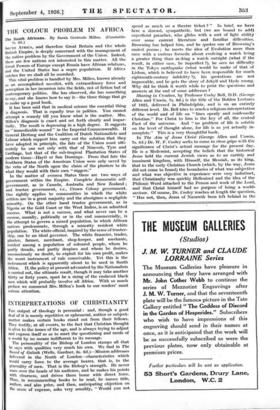THE COLOUR PROBLEM IN AFRICA
The South Africans. By Sarah Gertrude Millen. (Constable. 7s. 6d.)
Souni AFRICA, and therefore Great Britain and the whole British Empire, is deeply concerned with the management of
the native problem by the Government of the Union. Indeed, there are few nations not interested in this matter. All the Great Powers of Europe except Russia have African relations, and the United States has a negro population. If Africa catches fire we shall all be scorched.
This vital problem is handled by Mrs. Millen, known already as an accomplished novelist, with extraordinary force and perception in her incursion into the fields, not of fiction but of contemporary politics. She has observed, she has something to say, and she knows how to say it—the three things that go' to make up a good book.
It has been said that in medical science the essential thing is diagnosis. That is equally true in politics. You cannot attempt a remedy till you know what is the matter. Mrs.
Millen's diagnosis is exact and set forth clearly and impar- tially. The result is depressing in a high degree. It suggests an" immedicable wound" in the Imperial Commonwealth. If General Hertzog and the Coalition of Dutch Nationalists and Labour which support him carry out the solution that they have adopted in principle, the fate of the Union must ulti- mately be one not only with that of Nineveh, Tyre and Carthage, but that of the sub-tropical Plantation States of
modern times—Hayti or San Domingo. From that fate the Southern States of the American Union were only saved by the veto of the North upon the claim of the planters to do what they would with their own "niggers."
In the matter of oversee States there are two ways of government within the Empire. Complete democratic self- government, as in Canada, Australia and New Zealand ;
and trustee government, i.e., Crown Colony government. One rightly applies to communities in which the white
settlers are in a great majority and the aborigines a negligible minority. On the other hand trustee government, as in Nigeria or the Gold Coast or the West Indies, is an admitted success. What is not a success, and what never can be a success, morally, politically or in the end commercially, is the attempt to govern a mixed population, in which African natives predominate, through a minority resident white population. The white official, inspired by the sense of trustee- ship, can be an ideal governor. The white financier, trader,
planter, farmer, merchant, shop-keeper, and mechanic, resident among a population of coloured people, whom he partly dreads, and partly despises and whom he desires,
unconsciously no doubt, to exploit for his own profit, makes the worst instrument of rule conceivable. Yet this is the instrument which is apparently about to be used in South Africa. If, the policy at present advocated by the Nationalists is carried out, the ultimate result, though it may take another thirty or forty years, must be a rising of the enslaved black men which will probably involve all Africa. With so much preface we commend Mrs. Millen's book to our readers' most serious attention.


































 Previous page
Previous page